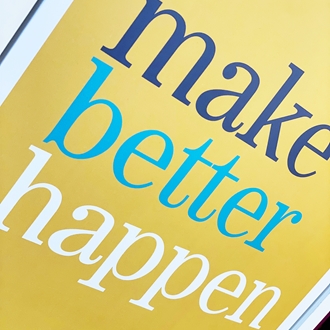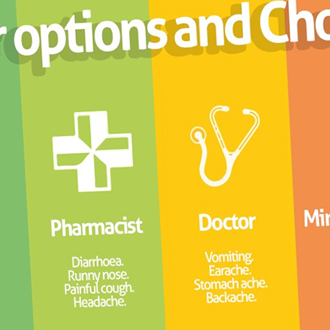365 that’s how many days we have been on the fastest learning curve of our lives, but what have we learned? On the 17th March, an unbelievable year ago, office work as we knew it came to a grinding halt. Suddenly, like most companies we were forced to face one of our greatest fears: full remote work. What have we learned after a year of working from home?
Spoiler alert: it wasn't all that scary.
Fear is often worse than reality. This seems to be as true for monsters in your wardrobe as it is for home working. For decades, the majority of companies have been reluctant to give their employees the freedom to work from home (or any other location for that matter).
Why? We are not fully sure, but we have some of our own thoughts. Probably it was a mix of beliefs and assumptions, lower levels of trust and fear of the unknown.
Clearly, the best way to overcome this fear is to have no alternative and, let's be honest, the pandemic did just that. We might have to face it - a global pandemic is a pretty bad way to have to learn. As humans, times of challenge and catastrophe to accelerate our change at work at home has hugely affected our thinking, emotions and constructs of how our lives are. Non more for the many NHS workers, their teams and organisations that at ICE we are privileged to support.
And we recognise for our team we have had an amazing protective bubble of our culture and the financial resilience that has protected us, along with some amazing commissioners and partners.
More positively, we were forced to experiment! Here is our good, bad and ugly of ICE’s and we believe the world's largest workplace experiment ever.
The good
ICE found that "remote work has been an overwhelming success for both employees and employers". Positive attitudes to remote work:
- As an Exec team we recognise it as a good thing overall as do 83% of employers who say the shift was successful for their company
- 11% report mixed results
- 6%, only, say it was unsuccessful.
For our team
- 79% say it was successful
- 16% say it was mixed
- 4% say it was unsuccessful.
and the employees from a UK sure survey, the numbers differ slightly:
- 71% say it was successful
- 23% say it was mixed
- 6% say it was unsuccessful.
Clearly, the majority of employers and employees saw it as positive.

One study found over half of employees want to work remotely three days a week or more. This is in line with another study that found the majority would like to continue working remotely as much as possible, even when the pandemic is over.
Executives seem to agree; less than one in five executives say they want to return to the office as it was pre-pandemic.
Another study concluded that the working conditions and wellbeing of employees on average hasn't changed a lot in 2020. That's a pretty powerful finding based on the fact that 2020 was such a turbulent year.
Imagine what could happen if remote work is not forced upon us by a virus, but is an option because people enjoy doing it.
Imagine what could happen if people could find a healthier balance between office and remote work - the hybrid future of working excellence.
Promising opportunities I hope you'll agree!
The bad
It's not all roses and sunshine. There are some dark sides in the sudden shift to remote work and the length of time we have been in lockdown.
Social isolation, children at home and poor working environments, like desks and seating and taking breaks, have caused team problems Wider than ICE we are finding workplace equality is under pressure (even more so than in normal times). "The involuntary nature of remote work, the greater demands at home (e.g. childcare and housework with less support), and the longer work-days that often characterised work during the crisis may also exacerbate work-family conflict", a study hypothesises.
The painful conclusion: would suggest finding that "women are likely to be more severely affected by the pandemic than men in domains such as well-being, job satisfaction, performance, and career progression." I have to say we have worked hard at ICE to support our whole team in diverse and often newly imagined ways, including much more flexible working hours.
Inequality isn't the only problem remote work is facing. A study published in HBR found that 40% of supervisors and managers expressed low self-confidence in their ability to manage workers remotely. At ICE we took a proactive set of steps, measuring mood monthly, offering coaching support, peer mentoring, and bi-weekly video messages from us as leaders, aiming to bring clarity to all the important metrics that our teams say are important to them. We have weekly virtual hubs and Monthly whole team get togethers and finally we set up what’s app groups for social only. We use MS Teams for work comms and what’s app just like our kitchen and corridors.
Although studies point to worker's perspective reflecting a similar picture: "Many workers experienced a strong sense that their managers do not trust their ability to do the work. Thirty-four percent agreed that their supervisors “expressed a lack of confidence in their work skills.” Micromanagement appears to be a problem experienced by many. In opposition for team ICE our colleagues have been outstanding, we are delivering more outcomes, switched to full virtual consultancy and increased client satisfaction by some 5-8% points from what was already a high level of satisfaction. “Better never stops”.
Remote work in a pandemic vs hybrid working in the future?
It's important to note that some of the above study findings are derived from a time when lots of other factors have dramatically changed as well. Social distancing, lockdowns, fewer social interactions and many more unusual restrictions have influenced us and our behaviour as humans:
"Scholars and managers usually believe remote working can provide employees with autonomy to alleviate work‐family conflicts (Gajendran & Harrison, 2007). However, our research shows that remote workers were struggling with work‐home interference as a major challenge, and work‐home interference in this context cannot even be mitigated by job autonomy."
All of us need to understand that current times are far from normal. And remote work during a pandemic is not the same as remote working in more normal times and unfortunately, some leaders can't wait to fall back on their magical skills of predicting the future.
In the above mentioned PWC survey Executives say they are worried about the effects of remote work: "68% say a typical employee should be in the office at least three days a week to maintain a distinct company culture."
How the heck would they know? This experiment will take 3-5 years and maybe it will improve culture?
So what do we do next?...
Well here is what we are up to, and with many of our partners.
Whatever organisations learn from this forced remote work experiment, one lesson is more important than all others:
LISTEN with everything to your teams with the aim to bring clarity and help them feel as certain and confident as they can.
Don't let misguided assumptions, a lack of trust in people, and fear of the unknown dictate how you work. For too long, they've kept organisations from experimenting with new approaches to work: approaches that—as proven again during the pandemic—contain a wealth of potential benefits.
We recommend that right now more then ever, take time to co-design then experiment, learn, adapt, and repeat it.
I’d love to find out if its similar or different for you and if you want to do something to predict a truly successful future and what that future is like?
Yours Stu
Check back this week to find out what we got up to as a team as we took a step back for a #recognition&resilience day to mark #1year0n since we left the office in a year like no other.
 Culture
Culture
 Design
Design
 Lifestyles
Lifestyles
 Insight
Insight
 Social
Social
 Creative
Creative









